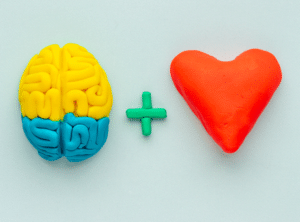Increase Your Must-Have Skill of Emotional Intelligence (EQ)
How Meditation & Mindfulness Develops EQ And Helps It Grow

Simply put, Emotional Intelligence (EQ) is your capacity to recognize your own feelings and those of others and to manage emotions effectively. One of the principle characteristics of EQ is the ability to adjust your emotions and adapt quickly to changing environments. A common misconception is that EQ is being sensitive or having a high level of empathy. It’s possible to have both those traits without being emotionally intelligent.
Emotional intelligence is a set of skills, 5 to be exact, that you can learn and cultivate over time. They help us on all levels, as business leaders, team members, partners and parents. Training ourselves in EQ skills takes some practice. A supportive habit that helps us train our minds for increasing our EQ is a regular meditation and mindfulness practice. These are powerful tools that actually strengthen your mind in four of the five categories of EQ.
WHERE DID IT COME FROM
The term was first coined in a 1990 paper by Peter Salovey and John D. Mayer who described it as “a form of social intelligence that involves the ability to monitor one’s own and others’ feelings and emotions, to discriminate among them, and to use this information to guide one’s thinking and action”.
Their research was turned into a book in 1995 by Danile Goleman who popularized this concept and brought it into the mainstream. At the time, Goleman, a trained clinical psychologist, was a science writer for the New York Times and specialized in brain and behavior research. His groundbreaking book, Emotional Intelligence, still rates as the number 1 book to read on the subject.
Goleman posited that it was not cognitive intelligence which guaranteed business success but emotional intelligence. There is plenty of research that supports this and demonstrates without much doubt that emotional intelligence is one of the major predictors of success and happiness in all relationships – personal and business.
While some people are naturally good at these intelligences, it’s not something that you are born with so don’t worry. You can learn them and improve on the ones you already have.
WHY YOU WANT MORE EQ
Emotional intelligence is a bedrock for building healthy relationships and the benefits are far-reaching, from being a better partner, parent and friend to being a better co-worker and strong leader. Developing our emotional intelligence opens up our potential for personal growth big time and most importantly allows us to have a deeper understanding of our own emotions, motivations, strengths and weaknesses. Important? Yes! Why? Well let’s just take simple advice form two of the greatest philosophers of all time from both the East and the West:
“Knowing yourself is the beginning of all wisdom.”–Aristotle.
“Knowing others is intelligence; knowing yourself is true wisdom.”–Lao Tzu.
You can be wise, bottom line. Awesome skill. With self-knowledge you communicate more effectively and handle relationship conflicts better because you’re operating from a higher level of understanding. You make more rational, thoughtful and responsible decisions, rather than being driven by uncontrolled emotions. As an emotionally intelligent person, you know how to roll with changes, and when facing uncertain situations, find a reservoir of emotional resilience to deal with stress. You can learn to thrive under pressure. Not bad for the simple practice of self-awareness.
In the business world, EQ has evolved into one of the biggest must-have skills in the workplace, especially among leaders, and is shown to be the strongest predictor of work performance. Just Google it. High EQ in business equates to behaviors such as staying calm under pressure, resolving conflict more effectively, responding to co-workers or employees with empathy and understanding so you’re less reactive and so much more even-keeled. In personal relationships, it does the same thing and makes you a better partner, parent, friend and you even like yourself more!
HOW CAN YOU DEVELOP AND GET MORE EQ?
The practice of mindfulness is a natural and highly effective way to increase your Emotional Intelligence. One of the foundations of both EQ and mindfulness is self – awareness. Mindfulness meditation helps train attention and awareness. You learn to reconnect to your core emotions, without judgment, and become comfortable with them. With regular practice, you become more attuned to your own emotions and thought patterns. This allows you to better understand what triggers different emotional reactions in yourself.
Mindfulness meditation practice also allows for more control over emotions – self regulation. This skill allows you to respond more skillfully rather than reacting impulsively when difficult emotions arise, and you’re less likely to fly off the handle or shut down. With ongoing mindfulness training, the brain gets better at self-regulating emotions because it gets used to sitting with them and trains you to create space for them and gain the skillful means of having that second before responding to have a choice on how you will respond.
“Between stimulus and response, there is a space. In that space is our power to choose our response.”
Viktor Frankl, Man’s Search For Meaning
As well, mindfulness opens up space to pay attention to other people’s emotions and perspectives. As you become less self-absorbed, you can extend more understanding and care towards others. Compassion, and being kind and compassionate not only helps others, it makes you feel good, too. I am sure you have experienced the positive emotions of giving and no matter how small the give, the more positive you feel and more content.
Mindfulness also helps settle the mind and help it focus. Focus is becoming a lost art and skill in this age of high distraction. Focus supports wiser decision-making that can be aligned with your core values, rather than impulsive choices driven by emotion. As we all know and learn sometimes the hard way, stepping back from emotions provides needed perspective.
The bottom line is that being mindful helps us constructively align our emotions and behaviors, and by handling our own emotions well, we improve all our relationships and personal interactions with others. These are all core skills related to superior emotional intelligence. Practicing mindfulness is foundational for developing three of the five EQ capacities.
EXPLORING THE CORE SKILLS OF EMOTIONAL INTELLIGENCE
So read on to practice!
1. Self Awareness

Many times a breakdown in communication comes from thoughtlessness, and speaking the first thing that pops into one’s brain. Oftentimes, we are not considering how our words or actions will affect those around us before we speak. Oftentimes as we think back on what was said, we later regret our words or decisions. While everybody makes mistakes, being mindful can help reduce regrettable behavior.
In conversations, especially ones that involve our emotions, it’s best to take a beat and try to realize the goals or outcome we hope to achieve before engaging. The conversations might be a bit loaded. Maybe you’re trying to solve a problem or clear up a misunderstanding, perhaps somebody has hurt your feelings and you want to express discontent. If you can think about these things before acting or speaking you are likely to make better choices in your interactions with others especially during stressful or emotionally charged situations. This doesn’t mean you will never make mistakes or act out, but if you’re able to keep an open mind and listen to others, you can learn from these mistakes and adapt so the next time you find yourself in a similar situation you have the tools to act differently and more in line with the goals you hope to achieve. Recognize your strengths and weaknesses so that you can build on the former and try to correct the latter.
Here are some tips on improving one’s self-awareness:
- Request for constructive feedback from others.
- Keep a journal of your thoughts and feelings.
- Practice mindfulness and meditation.
- Pay careful attention to your thoughts and emotions going into a discussion..
- Pursue your passions and do what makes you happy.
- Learn new skills and set goals for yourself.
- Reflect on your life experiences and practice gratitude.
- Use positive self-talk and affirmations daily.
- Work on building a growth mindset.
2. Self Regulation
Self-regulating your feelings doesn’t mean to banish them, in fact quite the opposite. All it requires is to be aware of the emotions you are feeling and decide the best way, time, and place to express them. Reaction and action are different things. Reaction is an involuntary response whereas action is a calculated and thoughtful undertaking. You take the time to plan your next steps in a way that can result in the best outcome.

If you’re feeling angry it might be best to take a beat before taking action. Having awareness of your feelings will help you understand them and the consequences of reacting which can greatly improve your interactions with the people around you and how they perceive you, as a kind and thoughtful person rather than reactionary and difficult. Know when to separate yourself from a situation whether that’s taking some deep breaths or a short walk.
All of this will make you more adept at conflict resolution and your ability to manage yourself in stressful situations as well as improve your people skills. Being mindful in your actions also means you will have more patience with others and will come off as a courteous and thoughtful person
Here are some tips on improving emotional self-regulation:
- Look at your challenges as opportunities.
- Be mindful of your thoughts and feelings.
- Build and practice distress and anxiety tolerance skills.
- Work on accepting your reflections and emotions.
- Use mindfulness, meditation and other ways to manage difficult emotions.
- Practice mindful communication and improve social skills.
- Recognize that one has a choice in how one responds.
- Take time to use cognitive reframing to change emotional responses and thought patterns.
3. Empathy
Empathy is another trait that mindfulness enhances. Most of us are at least somewhat attuned to the feelings of others. We can sense when someone is upset or feeling down and can act in ways to uplift them or make them feel better. This might seem like an easy thing to do but often people can struggle with this. It involves not just being aware of the emotional states of those around you but also being able to relate and identify with them. In practice, this can be easier said than done. It’s easy for others’ emotions to overwhelm you in the moment but practicing mindfulness can help you identify the moods of others and offer them the support they may need in difficult times.

On the flipside, if your boss is expressing anger towards you, listen to what they have to say and think about which aspects are valid and which might be words spoken in frustration. In either case throwing a reactionary fit is unlikely to help in either scenario. This doesn’t mean you can’t speak up to defend or reprimand, just that you do so in a way to properly communicate your feelings without alienating the other party. Empathy gives us the ability to see things from another’s perspective and feel their emotions. Putting yourself in another person’s shoes when they have valid upsets might lead you to act with compassion and do what you can to improve their situation.
Empathy has been shown to be one of the most valued and important characteristics of a good leader. People are more likely to receive and act on your instructions or advice if they are not feeling belittled or attacked but rather you are giving them the information needed to succeed. In our personal relationships, empathy is important because it allows us to understand our partner on a deeper level and build a stronger connection with them. When we can empathize with our partners, children, or friends, it makes us better equipped to handle conflict, offer support, and show love.
Here are some tips on improving social empathy:
- Be willing to share emotions.
- Mindfully listen to other people.
- Practice meditation and mindfulness.
- Engage in purposeful activities like a community project.
- Meet and talk to new people.
- Learn to try and imagine yourself in someone else’s shoes.
4. Social Skills

Proper emotional understanding needs to be put into action to have meaning. Just understanding one’s own emotions and those of others is not enough to build relationships. Putting this information to work in one’s daily interactions and communications is the essence of social skills.
Good social skills give us the ability to address issues as they arise and have more skill for accomplishing resolution without conflict. Research shows that every unaddressed conflict can waste almost eight hours of company time on unproductive activities, damaging resources and morale. In personal relationships, they disrupt emotional and physical intimacy, and breed resentment and emotional disconnection, leaving partners feeling unheard and undervalued.
Here are some tips on improving social skills:
- Ask open-ended questions
- Find neutral questions that will help start conversations
- Practice good eye contact
- Practice active listening with the entire body
- Notice other people’s social skills
- Show interest in others and ask them personal questions
- Watch one’s body language and that of others
5. Motivation
Emotionally intelligent people are those who are motivated by things beyond external rewards like fame, money, recognition, and acclaim. They possess a passion to fulfill their own inner needs and goals thereby obtaining internal rewards.
Those who are competent in motivation tend to be action-oriented and experience flow from being totally in tune with an activity and pursue peak experiences. They set goals, have a high need for achievement, and are always looking for ways to do better. They also tend to be very committed and are good at taking initiative.
How to Improve Motivation:
- Avoid overusing extrinsic rewards
- Celebrate your results
- Focus on setting small, measurable goals
- Introduce challenges to keep things interesting
- Set goals to help build intrinsic motivation
- Work with a friend or co-worker to foster accountability
HOW OUR MINDFULNESS MEDITATION + SAILING GIVES DOUBLE IMPACT
Learning to meditate and practicing mindfulness are directly related to increasing EQ. No question about that. Practicing mindfulness is a body awareness skill and having experiences like sailing, which is a highly mindful and aware experience, helps us embody the essence of mindfulness and start to learn to identify it within our body.
Plus, we believe in the naturalness of meditation and mindfulness as the body’s natural mechanism to recovering from stress. It is a deeply restorative practice. There are many doorways into meditation and we offer many different approaches that fit your body. If you can’t do it the way the yogi’s do it does not mean you can’t do it and have the same benefits. Check out our Mindfulness Meditation + Sailing Day Retreats if you’re interested in cultivating or strengthening your EQ and calm!
Ready to add more boating to your life?
Book a Luxury Yacht Charter on San Francisco Bay. Want to become a boater and enjoy regular boating? Join our Boating Club for private boating without the hassle of ownership. Learn teh ropes and take Private Lessons – sail or power – and learn faster and with greater confidence.
Looking to transform your stress and burnout on the water? Join one of our Day Retreats where we combine sailing with yoga, meditation, creativity, and stress reduction. About Us.